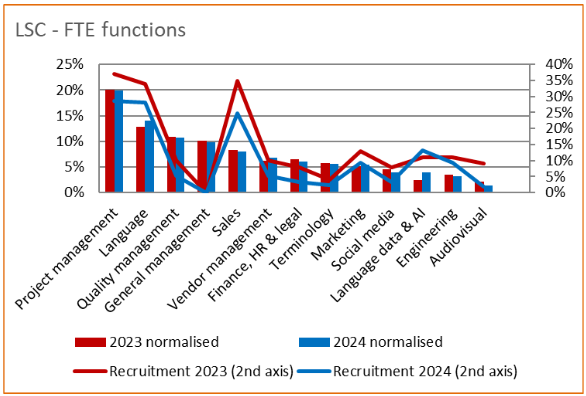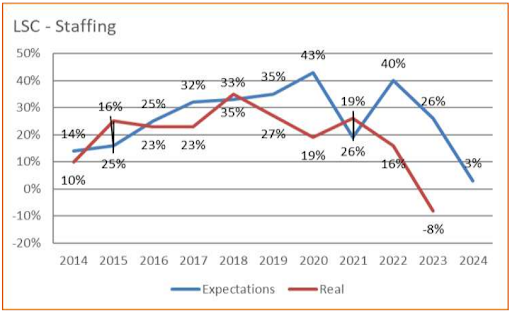In our latest article exploring insights from the 2024 ELIS report, Anu Carnegie-Brown, Stephane Hue, and Ursula Steigerwald share their perspectives on recruitment trends and evolving roles within the industry. They discuss the surprising percentage of staff involved in production roles, the implications of decreased recruitment plans, and the emerging roles driven by technology and innovation.
The ELIS report concluded that although the language market is primarily based on outsourcing and freelance professionals, with a median value of 18 staff members for the participating companies, one should not underestimate the employment potential of this industry segment.
The function distribution has not changed in 2023, with some 55% of language company staff (expressed in full time equivalents) directly involved in production, in a project management role, as linguists, multimedia experts or engineers. Participating companies have significantly toned down their recruitment plans in production areas such as project management and language, but also in sales (where the ambitious 2023 recruitment intentions do not reflect in the current staffing levels).
After staff size declining in 2023, language companies lowered their recruitment plans for all positions except language data & AI.

“Investment levels dropped further to net 9% and company participants reported net shrinkage of staffing levels in 2023 (28% reported lower staffing levels, 20% reported higher levels), with only meager restaffing expectations (3%) for 2024.”

What is the recommended ratio of management vs production staff?
ACB: I was intrigued by the figure of 55% of FTE language company staff being directly involved in production, when ‘production’ is defined as project management, linguistic work, multimedia and engineering tasks. In other words, they work in roles and with tasks I would put into the ‘Cost of Sales’ category in my management accounts. How does this figure sound to you? Here at Sandberg, over 75% of our 115-strong staff works directly in production (as defined here), but I have always known that we have a rather exceptional profile as a ‘language production company’.
US: I can only agree, seeing the figure of only 55% of the staff on LSCs being involved in production, caught me by surprise. Within Rheinschrift, 84% of our team with 53 team members are working in production – among them 25 internal linguists. I included our Vendor Management staff in the production pool – Vendor Management has not been mentioned in the survey, but at least for us, it contributes strongly to a smooth and successful production.
SH: I believe figures should be carefully interpreted here because the panel of respondents to the survey may have changed since the previous one was carried out.
Having dedicated staff in charge of marketing, HR, finance or even sales depends on the size of the company. Nevertheless, these roles are critical for the success of LSCs at a time of increased competition and rapid changes in clients’ expectations. In my opinion, sales and engineering are the hottest topics right now; Sales because we need more time to listen to our customers so that we can introduce new solutions, Engineering because language services are merging more and more with systems integration.
ACB: I was trying to google what the benchmarking figures are for professional service companies, since it’s not easy to say what management and support roles an LSC ‘should’ cover, and at which stage of their growth. For example, the rule of thumb seems to be that a good HR to staff ratio is 1-3 per 100 employees but my personal experience is that you need a decent HR function (inhouse or outsourced) well before you hit 100 employees. Once you have it established, it can remain relatively small, but if you expand your company internationally, you need HR solutions for each new location too.
US: In my opinion, Finance and HR need to be in reliable and stable (local) hands in order to support the company’s business without any additional hiccups. This way, focus can be on the money generating business aspects In our fast moving environment. I also see the need of dedicating time and resources to the fields of Innovation as well as Sales and Marketing. Positioning the business as LSC on the market where AI seems to be THE topic has become even more challenging.
How does a small company cover all the roles and functions?
SH: In small companies, the same people will have to wear multiple hats. Typical roles at LSCs where there is no dedicated FTE include legal, HR and marketing. Are these usually outsourced or simply not covered by anyone?
US: Expertise in Marketing, for example, is not often present in small LSCs; and the possibility to outsource to experienced suppliers within the industry means taking a big step ahead. The same goes for coaching or innovation services where needed. I would always keep HR and Financials internally in order to have full control on a day-to-day-basis.
ACB: LSCs these days have the option to outsource their marketing to experts that can be found within the localisation community; there are now marketing companies and consultants who know how our professional services should be presented and promoted. Legal advice is perhaps needed on a more adhoc basis? If you want it on language industry specific topics, you could seek help through your industry membership associations. HR solutions, on the other hand, become critical even when your company is still relatively small, and you have to source them locally because HR is so closely tied to your country’s legislation. In my experience, HR people don’t need to be experts in the localisation industry.
Are we seeing new job titles and roles emerging?
ACB: Sometimes understanding what a role looks like behind a specific job title can be difficult. Even in Europe, there is a lot of variation between the countries in how restricted job descriptions and job titles are. In the UK, where I am, there is more freedom whereas in some other countries the job title has to be taken from an ISO classification list. The only role I can think of in our company that carries actual legally defined responsibilities and accountability is the role of Director.
SH: In addition to engineering/AI types of roles (I would lump them together into ‘Langops’ type of roles), there are two new types of roles I can see emerging: a) transformation and innovation role (i.e. change management) to make the changes happen faster and b) roles based on creativity. This is linked to a move towards extended services that blend translation and multilingual content creation.
US: We can definitely see new jobs and roles emerging – as we need to develop a different kind of expertise in order to adapt to the ever increasing technological requirements. As a leader, I can see young people taking on additional responsibilities and tasks – driving their motivation and keeping them on board. We have involved Project Managers and Linguists with tech ambitions and knowledge in our transformation and innovation processes. This means, we are creating hybrid roles, perhaps this is more a feasible option for smaller companies?
How do you see roles and recruitment evolving within your company and our wider industry? How does company size and stage of growth impact these insights in your opinion? Share your thoughts and experiences with us on LinkedIn. #ELIAdiscussion





